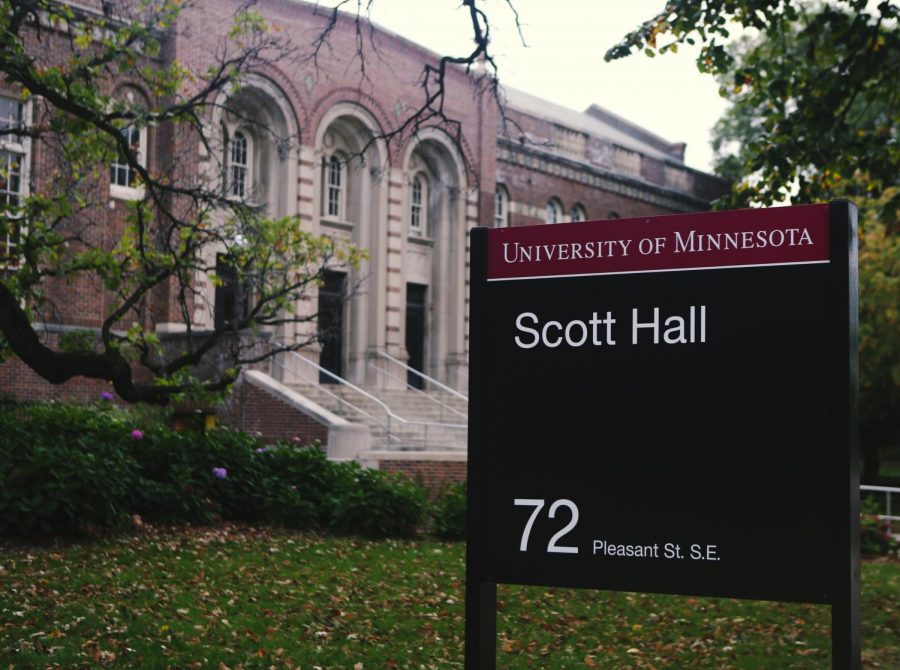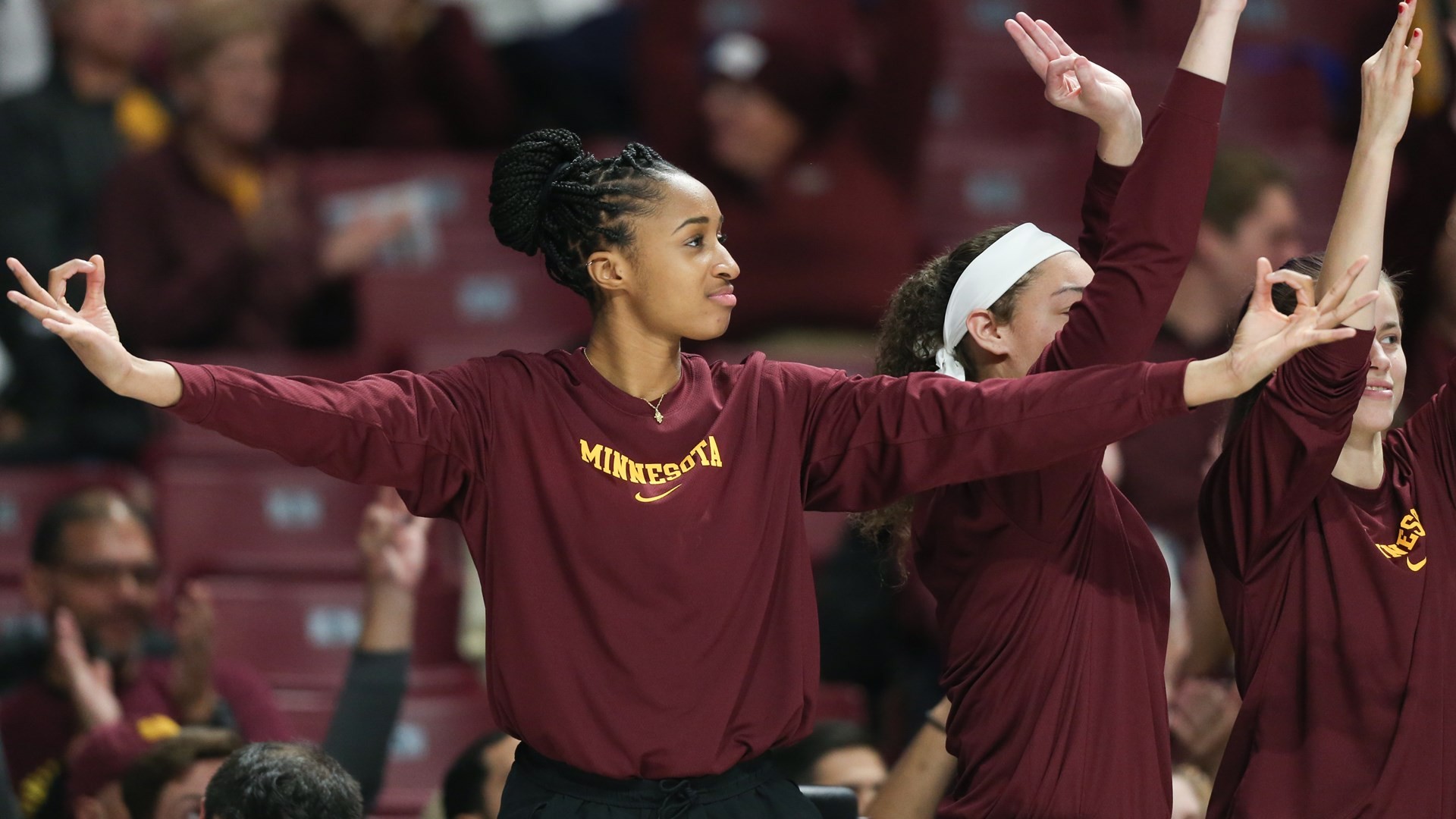The fall semester brings the establishment of the new Center for Race, Indigeneity, Disability, Gender and Sexuality Studies (RIDGS) at the University of Minnesota.
When the RIGS initiative was adopted in 2015 following student and faculty advocacy, conversations surrounding its intersection with disability emerged as time went on.
This past year, these conversations contributed to the RIGS initiative becoming a University center and in turn, the RIGS faculty decided to formally incorporate disability into the new center’s title, following advocacy from the Critical Disability Studies Collective.
The new RIDGS Center will be headed by Director Keith Mayes.
“The reformation of the center around disability … I think becomes an opportunity for students to understand that there are opportunities to communicate and share interests, research and other ideas about disability in that framework,” said David Johnson, chair of the University’s Disabilities Issues Committee.
The Critical Disability Studies Collective (CDSC) was ultimately responsible for the incorporation of disability into the formal title and scope of the new center.
“The CDSC is really an organization that’s working to enhance and foster an intellectual and academic community, in the Twin Cities and at the University of Minnesota, around complex understandings about disability,” Angela Carter, the founding chair of the CDSC, said. “We think of disability as a social, historical, economic and political category rather than a medical problem that an individual needs to fix or address.”
During her graduate studies at the University, Carter said the lack of disability community groups for students was the reason she founded the CDSC.
“My inspiration [for founding the CDSC] was really my own needs and recognizing my own needs as a disabled scholar, educator, organizer on campus, and feeling very alone both in my identity as a disabled person and disabled graduate student, and also in my work in critical disabilities studies,” Carter said. “I just didn’t have that community that I needed.”
In 2015, a few of Carter’s friends and colleagues joined in the creation of the group. The following year, Jessica Horvath Williams, a postdoctoral associate in English, became a co-chair of the group. Carter and Horvath Williams’ worked together to make the CDSC an official affiliate of RIGS in 2017.
“We came under the umbrella of RIGS,” Horvath Williams said. “We needed a home, so we petitioned RIGS to join them.”
For the past four years, Carter and Horvath Williams worked alongside the other CDSC members to formally include disability in the title of the center.
“Last year, Angela and I, as co-chairs, with the permission of the CDSC, wrote a very long letter requesting our formal incorporation into RIGS,” Horvath Williams said. “And so RIGS is now RIDGS.”
Student groups and University committees across campus have voiced their support for the transition from RIGS to the Center for RIDGS this fall.
“I want to acknowledge that I am very happy to see disability as part of the conversation about diversity and intersectionality on campus,” Johnson said.
The Organization for Graduate and Professional Students with Disabilities (OGPSD) is also supportive of the formation of the new Center for RIDGS, but it has raised concerns over the potential failure to consult students with disabilities in the decision to transition from RIGS to RIDGS.
“One issue I have frequently advocated about is that, many times on college campuses, diversity, equity and inclusivity efforts include many marginalized populations, to their credit, but unfortunately all too often routinely exclude students with disabilities,” said OGPSD President Ryan Machtmes.
Machtmes added that although OGPSD was not consulted about this decision, it was a positive change and a step in the right direction for the University.
“I recognize that the University is actively making strides towards improving campus climate and accessibility for students with disabilities,” Machtmes said. “But of course, it does have a length to go before we can claim to be a truly accessible and welcoming campus for all individuals with disabilities.”
Additionally, OGPSD members hope to see the Center for RIDGS take on new initiatives, now that disability is formally included in its focus. Machtmes said he would personally like to see the establishment of a University disability studies program.
“Race and gender and sexuality and indigeneity, all of those things, are connected to disability in a very real-world way,” Horvath Williams said. “The argument of the Critical Disability Studies is that we can’t talk about any of these things without talking and thinking through disability as well.”
Many students and faculty hope the CDSC’s activism to get disability included in the RIDGS Center will foster conversations about the intersectionality of disability with other identities.
“The issue is to develop an understanding of these issues around disability across campus, trying to destigmatize disability and view it as a natural condition of life and living,” Johnson said.


















Rusty
Oct 15, 2021 at 12:49 pm
Hitler was a Crypo Jew. He got all his ideas from the Talmud.
CapnRusty
Oct 15, 2021 at 12:43 am
You need professional help. I hope you find it.
praiseinterracialmarriages
Oct 14, 2021 at 4:56 pm
As always, it is clear that you lack an understanding of a liberal arts education. This department will do worlds of good into bringing enlightenment into the world, as well as easing the path for new friendships to be developed by people and organizations which hope to develop them. Inroads into corporate training and promotion of talent from within the ranks of RIDGS cohorts will do additional good to enliven and move our world forward.
You appear to have a lack of awareness of models for cooperation, as well as soft skills development. Money dedicated to seemingly meaningless endeavors — to you — can have a great influence on the world. The walks of Moses, Jesus Christ, the Prophet Muhammad, and farther back, Shakyamuni Buddha; and Gandhi, King and Ikeda all speak of caring for and promoting people within the cohorts which you blast with your ignorance.
praiseinterracialmarriages
Oct 14, 2021 at 4:07 pm
You appear to be a very insecure and reality-blind individual. Minnesota is home to people from many parts of the world. You certainly do not write as an enlightened Christian. I lived with the vice president of the former American Lutheran Church. We had missionaries living with us on their return from Africa and Latin America. There are many Jews, Buddhists, Hindus, Sikhs, Baha’i, several Zoroastrians, animists and Muslims in Minnesota.
Please make an appointment with a therapist for your xenophobia and hatred. A man who was one of Adolf Hitler’s rocket scientists, Werner von Braun, was instrumental in the Apollo program. Do you take pride in his past life, too? You post a photo of John F. Kennedy, whose economic advisor, Walter Heller, was a University of Minnesota economics professor and one of my luncheon companions. Kennedy’s concern for the rest of the world was so profound that he started the U.S. Peace Corps. Please take a few history and sociology courses before you make another huge gaffe.
A Black woman did the numeric calculations to assist the Apollo program get into space, as well. She was not “Euro-Christian.”
praiseinterracialmarriages
Oct 14, 2021 at 4:01 pm
I’m really happy to see the inclusion od Disability as a member-cohort of, now, RIDGS.
As a student at University of Minnesota, during various periods between 1986 through March of 1996, as a full-time student and part-time student who lived in fraternity houses as a non-alcohol or drug imbibing pledge (where drugs and alcohol were prevalent in the former construct of Phi Delta Theta Fraternity in 1986, now under new management, and which I had the displeasure of finding), and dormitories, I made many friends and was involved as an executive and board member on both student organizations (Minnesota International Student Association and the former International Study/Travel Association, now incorporated into One-Stop).
However, I began to experience problems associated with Bipolar-Depression while living in Centennial Hall, then administered by Bob W. Baker as a director who made life difficult for me due to his apparent inability to accept that some of the students had mental health diagnoses and Asperger’s Syndrome (now incorporated into the Autism Spectrum “Disorder” family).
I was stalked, harassed and beaten for two years in the dormitory and on campus around Washington Avenue, Ford Hall and in the Mayo Building by Hai Nguyen and one of his friends, after medical student Son Nguyen, a resident on the fifth floor of Centennial Hall where I lived (and who I thought would keep my diagnosis to himself), told his younger and maladjusted brother.
For two years, I was inundated with physical assaults, sexual and pornographic letters from Hai, and interruptions of my mail delivery route for Quality Assurance at the Mayo Building by Hai.
UMPD Captain Fran Gernhandt, in a telephone call to me, said, “Barry, you’re mentally ill. You bring on your own problems. Therefore, UMPD will neither investigate nor arrest anyone on your behalf.” Lieutenant Metcalf, a woman. told me to stop calling UMPD for assistance, and that they wouldn’t intervene. My grades went to Cs through one F. I never made it to graduate school with a GPA of 2.43; though, when I studied in Europe and Latin America, where abuse was not involved and where the administrators and instructors thought warmly of me due to my care for other students and the community, my performance was a 3.66 GPA and other excellent performance. I was conversational in three languages beyond English (no longer true). At University of Minnesota, Hai called me with a death threat if I didn’t stop dating a woman who I had known since my days spending time at Macalester College’s chapel with my friend, Rev. Russ Wigfield, and my former fiancée Alexandra, whose dad became president of a South American nation.
The memories of that period have compounded my fears of going into public and working among others who can be very cruel to people simply because the term “mental illness” doesn’t resonate with them. This is what PTSD can do to people. I see a therapist every Thursday to unravel my history and talk about things which strengthen my self esteem and sense of security. I’d wanted to be an attorney, diplomat and businessman. The University’s recklessness squashed those dreams. I believe this is due to the movies and television dramas which depict mentally ill people as both pathetic and violent — despite recent figures that only 7.5% of violent crime is due to people with mental illnesses, and those are generally due to crimes associated with drug and alcohol addiction. This leaves 82.5% of violent crimes due to people without mental illnesses.
RIDGS might start a consortium of writers, like myself, who would tell their stories in an effort develop a warmer recognition of people with mental and physical disabilities who have been achievers. My personal story involves friends and acquaintances from all over the world, from indigent people on the streets and in Africa who I have helped, to members of foreign aristocratic and royal families, and everything in between. I know I would flourish with collaboration and direction.
I have lived in the U.S., Europe and Latin America. A friend of my dad developed guidance and tracking systems for NATO missiles, and the husband of another friend developed an antennae complex located on one of the Mars rovers. My step brother worked in the NASA space shuttle wind tunnel as an aerospace engineer, and Christina von Braun, the grand-daughter of Werner von Braun who worked as a rocket developer for the Third Reich (NAZI Germany) and was captured by the U.S. intelligence community and came to work at NASA on Apollo spacecraft which went to the moon was a friend and Centennial Hall dormitory food service worker. Stories like mine and other people can really change the face of disability, which is often conjured up and makes us look like pathetic and dangerous creatures.
University of Minnesota has still not settled with me for damages as a result of nonfeasance and malfeasance. This has led me into a life of poverty due to the depression and anxiety which I have experienced and made it virtually impossible for me to feel comfortable in a work environment and public environment due to the compounding effect of horrific memories encountered on campus when administrators and police refused to intervene. Shelley Carthen-Watson, Macalester College Alumna who I remember from Dayton Hall and brought you dinner one day when I heard you were ill, you are a member of the General Counsel. Please consider supporting a final settlement. I have lost millions as a result of the crass indifference and discrimination I experienced at University of Minnesota by a few officer and administrators who should have supported my scholarship and right to live in peace.
Former security service escort Ryan Rivers, who was a police sergeant at University of Minnesota the last time I checked on his whereabouts, lied to police officers about me one night when he said I was committing disorderly conduct in 1988. Based on shrill gossip, he was under the impression that I “had sexual relations with young children,” a comment made in an arraignment report after he had me arrested for “disorderly conduct” after his comments and behavior towards me thirty-three years ago led me to demanding that the group of three stand down.
The basis for his belief that I had sex with children was a comment I made to a male freshman escort that March when I told him that my fiancée was raped at the age of five-years by her nanny’s fifteen year old son, Tony. I believe, but am not certain, that Rivers had anxieties about people with mental illnesses. His first experience with me was extremely hostile and he threatened, the night of my arrest, to have me arrested after I put my hand on his left should in an effort to calm him down.
He threatened to have me arrested for fifth degree criminal assault for merely touching his shoulder. He may have changed. The historic record shows that Minneapolis Police Department honored him with an award for valor for taking a bullet in the leg during pursuit of a suspect.
I was released from detention hours early as the deputies in Hennepin County noted how kind I was to detainees who had been harassing me because I was an upper middle-class White guy. I counselled one thirty-year old man who had pushed me and made unsavory racist comments to and about me to plea no contest for his moving violation and to plead guilty to the six other counts on his bench warrant, to the degree that he believed they were legitimate charges. I mentioned that my dad was a prosecutor and his first partner was a district judge. I encouraged him to ask the judge for assistance in getting out of crime, as he had been a thief since age 14-years and in and out of jail. I noted an organization of attorneys and judges which served as mentors. I am a peaceful individual who only seeks respect, where respect is due, and friendship. This is a face of disability and mental illness which is rarely seen or talked about, and I would be happy to engage in collaboration with members of the RIDGS organization to share my ideas.
The inclusions of Disability to RIDGS is, indeed, a momentous achievement. In some parts of the world, disabled people are cast aside — as I have been by my family who lost interest in me after they heard that I developed a small philanthropic program of assisting orphans in Ghana on poverty-level income. My dad wanted me to only tell him of my famous friends, not about my poor friends. Mother Theresa would’ve been an outcast in my family, too: Disability and caring for extremely poor people. Once I begin my insurance practice, I will assist a children’s mission in Jinja City, Uganda, and send my adoptive adult children to college and high school, and help the Catholic orphanage in Kumasi, Ghana, long due as I promised my friend, the late Archbishop Emeritus Thomas K. Mensah that I would assist after he kindly checked into the reputation of a young orphan who was attending one of the Catholic schools in his diocese, who is now my son.
praiseinterracialmarriages
Oct 14, 2021 at 7:59 pm
Your values align with NAZI conquest.
Rusty
Oct 14, 2021 at 5:44 pm
The Values. Euro-Christian.
praiseinterracialmarriages
Oct 14, 2021 at 5:08 pm
Review my comment to Gopher, above. You lack insight and are not, apparently, anyone with a large business or active in the management of a government or nonprofit organization.
A Gopher
Oct 14, 2021 at 4:11 pm
Just keep in mind that when students complain about admin bloat and rising tuition that non-earner departments, such as this one, should serve as a prime example of academic frivolity and waste.
CapnRusty
Oct 14, 2021 at 2:29 pm
The only market for people who graduate with degrees in Race, Indigeneity, Disability, Gender and Sexuality Studies will be universities who have departments of Race, Indigeneity, Disability, Gender and Sexuality Studies. Kind of like a self-licking ice cream cone . . . at taxpayer expense. And the taxpayers are getting tired of this game.
Rusty
Oct 14, 2021 at 12:08 pm
The Culture of Minnesota is Euro-Christian based and no other.
It’s the Culture of real progress. The Culture that sent people to the Moon.